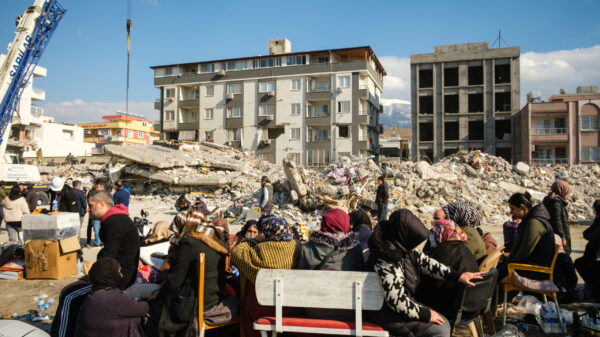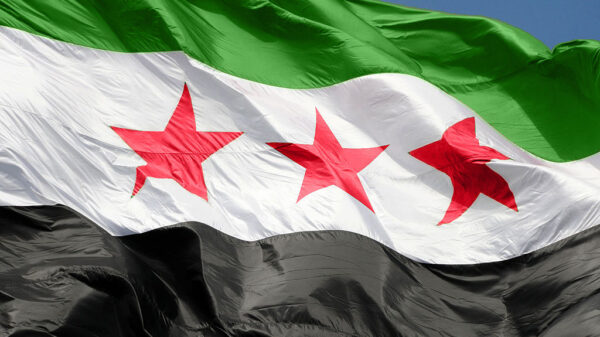Features Editor Naz Karadede on the devastating Turkey-Syria earthquake and what can be done to support and help King’s students and those in Syria and Turkey who have been impacted.
Arguably the hardest time to be an international student is when a crisis happens back home. The war in Ukraine, the floods in Pakistan, and the earthquake in Turkey and Syria are just a few examples of the major crises that have happened in recent times. If you’ve witnessed any form of national crisis as a student studying abroad, then you know how difficult it is to worry about the state of your country and the well-being of your family whilst also having to continue the façade of living as a normal university student. Luckily, it is during times like these that we often find the strongest networks of support and solidarity, even though the situation might, at first sight, appear to be bleak and hopeless. In light of the recent earthquake in Syria and Turkey, I’ve compiled a list of ways that you can help support those in Turkey and Syria who have been affected by the crisis and the help and guidance being offered by the university to King’s students.
A short timeline of the earthquake
The 7.8 magnitude earthquake that devastated Turkey and Syria struck Gaziantep, a city in southern Turkey bordering Syria, on February 6 at around 4.17 a.m. local time. Strong tremors were felt in Syria, Lebanon, Cyprus and Iraq. Provinces around Gaziantep in Turkey suffered serious damage and Syria reported the collapse of numerous conflict-damaged and poorly constructed buildings near the city of Aleppo. Initial statements from AFAD, Turkey’s disaster and emergency relief agency, and Syria’s official news agency announced that 72 people had been killed in Turkey and 42 in Syria respectively.
Only 11 minutes after the initial earthquake, an aftershock of 6.7 magnitude hit the region, merely the first of the 112 aftershocks recorded by officials, the strongest one being of 7.5 magnitude. The scale of the disaster immediately mounted with a rapid increase in damaged infrastructure and the number of collapsed buildings; historic sites in Turkey were also severely damaged. Estimated fatalities also rapidly increased, to 200 in Turkey and 300 in Syria. Both President Recep Tayyip Erdogan in Turkey and President Bashar Al Assad in Syria held emergency meetings to discuss the best possible response to the earthquake.
When I first read about the earthquake at 10 a.m. UK time, the death toll had reached 1,500. By the same time the next day, the death toll had almost tripled to 5,000. As I am currently writing this article now, the death toll has exceeded 11,000 with 8,754 confirmed deaths in Turkey and 2,470 in Syria. And more than 300,000 people have been displaced from their homes. But it doesn’t end there. The World Health Organisation has warned that the fatalities could reach up 20,000, in what has been described by experts as the worst earthquake to hit Turkey since 1939. Not to mention the largely irreparable destruction of homes, hospitals, schools, airports, and historic sites.
Part of the reason why the damage has been so devastating and the outcome so catastrophic is because the earthquake struck one of Turkey’s most infrastructurally and economically vulnerable regions. Decade-long conflict in Syria has also weakened its infrastructure and made it more vulnerable and susceptible to damage during natural disasters. What’s more is that freezing weather conditions are not only worsening the plight of victims, making them susceptible to die from cold or starvation even if they survived the earthquake, but are also making it infinitely harder for aid to reach the region.
What can be done to help
Turkey and Syria urgently need all the help that they can get, and they need it as soon as possible. A variety of different countries have already pledged to provide aid, resources, and emergency search and rescue teams to Syria and Turkey. Among them are countries such as Azerbaijan, the U.S., the U.A.E., Saudi Arabia, Jordan and countries in Europe, such as Greece, Britain, and Germany. Whilst it is heart-warming to see the international response, considering the scale of damage and destruction, there is no such thing as “enough aid”. The fatalities are constantly rising and in anticipation of how long it’s going to take to recover, Turkey has declared three-month state of emergency in 10 of the affected provinces. For those of you who are wondering how to help out, I’ve made a list of reliable charities and organisations, both within and outside Turkey, that are accepting donations for Turkey and Syria:
In Turkey:
1. AFAD (Turkey’s official Disaster and Emergency Relief Agency)
Accepts donations in Turkish liras, US Dollars, and Euros.
2. Kizilay (Turkish Red Crescent)
One of Turkish’s largest humanitarian organisations for disaster and emergency relief, equivalent to the British Red Cross. Accepts donations in Turkish liras, US Dollars, and Euros.
3. AKUT (A voluntary search, assistance, and rescue organisation in Turkey)
Accepts donations in Turkish liras, US Dollars, and Euros.
4. AHBAP (One of the most active rescue and aid organisations in the region)
Accepts donations in Turkish liras.
International charities and organisations (for both Syria and Turkey):
1. British Red Cross
The British Red Cross has created a Turkey-Syria appeal to aid evacuation efforts and provide emergency aid in unison with the Syrian and Turkish Red Crescent. The the link to the appeal can be found here.
2. Oxfam
The link to Oxfam’s Turkey-Syria appeal, which is focused on working with other organisations to supply both countries with long-term aid, can be found here.
3. UNCHR (UN Refugee Agency)
The United Nations’ Refugee Agency has also created an appeal for Turkey and Syria.
4. UNICEF
UNICEF’s appeal for Syria and Turkey is focused on aiding and rescuing families and children in Turkey and Syria, prioritising water, sanitation, and emergency shelter. The link can be found here.
5. International Rescue Committee
The International Rescue Committee is an international humanitarian organisation, working in more than 40 countries, that aims to respond to the most serious humanitarian crises. The link to donate to its efforts in Syria and Turkey can be found here.
6. White Helmets
The White Helmets are a voluntary organisation that was founded in Syria in 2014 following the outbreak of the Syrian Civil War and it continues to provide search-and-rescue, evacuation and other services to civilians. You can donate to them for the earthquake here.
The help and support being offered at King’s
King’s has made a comprehensive list of the different services available within the university to help and support students who have been impacted by the earthquake. Moreover, Faculty Wellbeing and Welfare Advisors have been contacting students of Turkish and Syrian nationality to make them aware of the support available to them. Students who are struggling during this time can email their faculties to identify their specific needs, including adjustments to their studies. King’s Counselling and Mental Health Service, the KCLSU positive peers, and Faculty Wellbeing Advisors are offering free counselling services for students who require emotional support. Students who need financial advice during this time can also contact [email protected].
KCL’s Turkish Society have announced that they will be holding a fundraiser to help victims of the earthquake this Friday, on February 10, in front of the Strand, Bush House, and Guy’s campuses. They will be at each campus from 10 am until 5 pm. As of today, they have announced that they will only be accepting financial donations, in the form of cash or credit card payments, so if you are on campus this Friday, please make sure to give them a visit!
If you have any unused or spare clothes, KCL’s Orange Society will also be collecting clothes donations for victims of the earthquake. They will be at Guy’s Campus West Wing, Activity Room 2, on February 10, from 10 am until 5 pm.
















